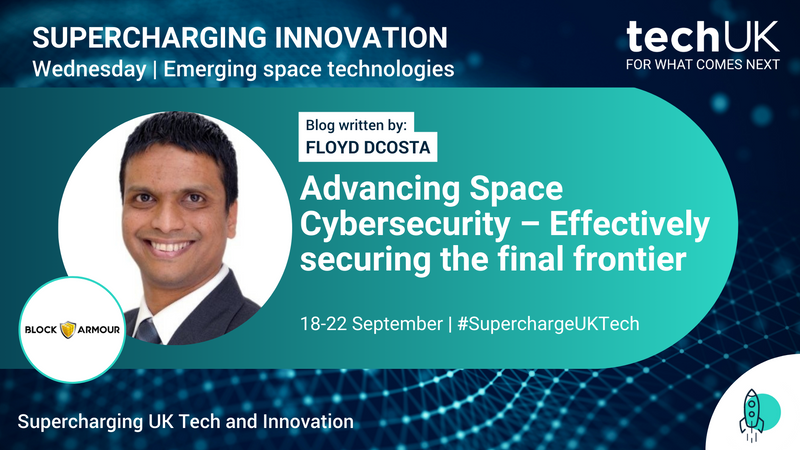Advancing Space Cybersecurity – Effectively securing the final frontier (Guest blog by Network Science)

Space technology has evolved rapidly ever since the first satellite was launched into orbit in 1957. Today, there are over 5,500 active satellites in orbit, and one estimate predicts the launch of an additional 58,000 by 2030. While we may not always realize or appreciate its existence, space infrastructure has become an integral part of everyday life, with individuals, businesses and governments relying overwhelmingly on it. From facilitating global communications and navigation to emergency management, weather and environment monitoring to security/defense and beyond, many critical services on Earth depend upon satellite networks and space-based systems. According to one research, the global satellite data services industry is projected to generate $19.36 billion by 2027, growing a CAGR of 19.1%.
The Space Security Conundrum
Despite the space industry’s rapid growth and technical sophistication, its cybersecurity efforts have lagged behind that of other high-tech sectors. As satellite-based service infrastructure has evolved, it has also become more complex with multiple stakeholders operating different parts of the system. This has resulted in security becoming piecemeal, delivered part-by-part (inter-satellite, uplink, downlink, and last mile at both ends) by the respective segment operators, with exploitable gaps in between. Furthermore, with the supply chain for hardware as well as software dependent on multiple independently manufactured component parts, exactly pinning down the responsibility for the security and resilience of the end-to-end system on one single entity becomes a challenge; thereby often putting the onus on end users, whether individuals, enterprises, or government organizations.
Recent events including the successful hacking of Starlink’s satellite terminals by a Belgian cyber security researcher using a $25 homemade device and the massive cyberattack against a satellite network that took tens of thousands of modems offline at the onset of the conflict in Ukraine have revealed that these threats are not theoretical anymore. The challenge is real.
Raising the bar on Space Security
With the shift towards modern software-defined satellites and cloud based systems, the industry now has an opportunity to fix the long-standing security issues. The move from specific purpose-built, proprietary hardware to more advanced software-defined, modular architectures, and open extensible frameworks allows for security to be built into the core of these next-gen Space systems.
Separately, modern approaches to cybersecurity like Zero Trust, which is swiftly becoming the preferred security paradigm for today's contemporary enterprise-IT environments, also offer opportunities to deliver end-to-end next-gen security for the space and satellite based, natively ‘perimeter-less’ networks.
Blending tools like Software Defined Perimeter (SDP) architecture together with rapidly evolving Blockchain and IoT technologies can deliver credible solutions to protect satellite networks and integrated space systems against emerging cyber threats. SDP architecture can be used to render critical systems, satellite hardware, ground stations, and gateways invisible to attackers while customized agents along with private Blockchain technology could deliver a new breed of digital identity and access control for all uses and devices connecting into the network.
By harnessing Blockchain-based digital signatures - not just IP addresses - to identify, authenticate and authorize devices, the solution will be able to deliver end-to-end Zero Trust security across space, space to ground, and terrestrial networks. The system would create an encrypted tunnel running end to end atop existing infrastructure, thus delivering ultra-secure enterprise, government, or IoT mesh networks over SatCom channels.
Collaborating to secure the final frontier
The potential of satellites and space-based systems promises to grow rapidly with new opportunities springing up across industries and incessantly pushing the boundaries of space technology. However, as declining launch costs, advances in technology, and rising private sector interest propels space exploration into a trillion-dollar industry, the new space race will get more heated, crowded, and dangerous.
With internationally harmonized regulatory frameworks yet to be put in place and universally enforced, the various stakeholders in the industry - manufacturers, operators, software developers, cybersecurity solution providers, government organizations, and others – will need to forge alliances, closely collaborate, leverage modern approaches and emerging technologies, to jointly ensure the end-to-end security of today’s ever-critical satellite networks and space systems.
Help to shape and govern the work of techUK’s Cyber Security Programme
Did you know that nominations are now open* for techUK’s Cyber Management Committee? We’re looking for senior representatives from cyber security companies across the UK to help lead the work of our Cyber Security Programme over the next two years. Find out more and how to nominate yourself/a colleagues here.
*Deadline to submit nomination forms is 17:00 on Tuesday 18 October.
Upcoming events
Get involved
All techUK's work is led by our members - keep in touch or get involved by joining one of the groups below.





